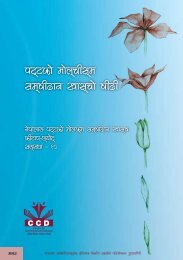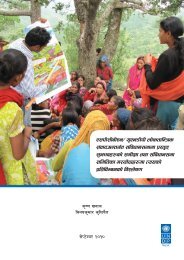English - Support to Participatory Constitution Building in Nepal ...
English - Support to Participatory Constitution Building in Nepal ...
English - Support to Participatory Constitution Building in Nepal ...
You also want an ePaper? Increase the reach of your titles
YUMPU automatically turns print PDFs into web optimized ePapers that Google loves.
The Remake of a Statemodalities of state build<strong>in</strong>g should <strong>in</strong>corporate this sentiment <strong>in</strong> both theemergency and longer stabilisation phase.On the other hand, the poorest of the poor, around 20 per cent of <strong>to</strong>tal,may not have access <strong>to</strong> network or resources <strong>to</strong> even go <strong>to</strong> India. Butthose who go <strong>to</strong> Gulf States and Malaysia remit almost 100 per cent of themoney they save precisely because they cannot keep money <strong>in</strong>def<strong>in</strong>itelythere. And figures show that these people who go <strong>to</strong> Gulf States andSouth East Asia are the ones who have been susta<strong>in</strong><strong>in</strong>g <strong>Nepal</strong>eseeconomy. Remittances from Gulf accounted for almost 75 per cent of <strong>to</strong>talremittance for <strong>Nepal</strong> (Khatri 2007). However there are other dimensionsof these migrants we have forgotten. By categoris<strong>in</strong>g them as less skilled,we have misunders<strong>to</strong>od the dynamic nature of the flow of knowledge,skill and acquisition. By bundl<strong>in</strong>g them <strong>in</strong><strong>to</strong> a box of unskilled labour forceand clos<strong>in</strong>g the lid of the box thereafter, we have been clos<strong>in</strong>g our eyes <strong>to</strong>what new development takes place <strong>in</strong> their capacity as human resources.This belief that they cannot ga<strong>in</strong> anyth<strong>in</strong>g goes aga<strong>in</strong>st the many researchbasedevidence of sociological understand<strong>in</strong>g. It has been proved thatthere is a dual relationship between <strong>in</strong>dividual as a subject and societyas a structure <strong>in</strong> which daily practices of livelihoods of subject takeplace. Sociological theories have proved that the structure of the societydeterm<strong>in</strong>es the disposition of human as <strong>in</strong>dividuals who occupy positionwith<strong>in</strong> it as much as the human be<strong>in</strong>g can <strong>in</strong>fluence the structure. So, <strong>to</strong>assume that the labour migrants cannot ga<strong>in</strong> any form of new knowledgeand skill <strong>in</strong> the migration process and <strong>in</strong> the dest<strong>in</strong>ation country is nottrue. In the context of the <strong>Nepal</strong>, it has not seen how this new knowledgeget localised and how it is used for local positive outcomes.A controversy surround<strong>in</strong>g remittance is its impact on <strong>in</strong>equality. Ampleexamples can be cited on both ends of the debate. But the f<strong>in</strong>al conclusiondepends upon a host of criteria used <strong>to</strong> evaluate the debate: some ofthem be<strong>in</strong>g time frame, location, type of <strong>in</strong>equality etc. (Khatri 2007).A study <strong>in</strong> Bangladesh reveals that though migration could <strong>in</strong>crease<strong>in</strong>equality between well <strong>to</strong> do and very poor with<strong>in</strong> the village of orig<strong>in</strong>, ithas decreased <strong>in</strong>equality between traditionally rich people <strong>in</strong> the villagesand the many poorer households that had opportunities <strong>to</strong> earn moneyabroad. This has also resulted <strong>in</strong> chang<strong>in</strong>g of perception of the traditionallyrich people <strong>to</strong>wards the poorer. It has also opened different avenues of<strong>in</strong>tegration between the rich and the poor (for example, through trademade possible by open<strong>in</strong>g shops by remitted money, friendship betweenchildren and thus between houses as the children of migrants household179




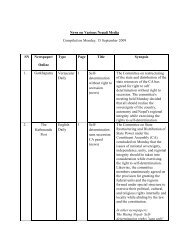
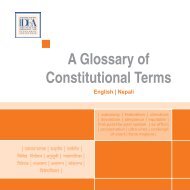
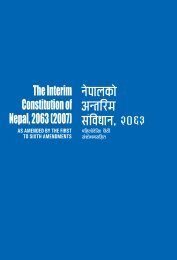
![g]k fnsf blntx? / gofF ;+l jwfg](https://img.yumpu.com/49483602/1/184x260/gk-fnsf-blntx-goff-l-jwfg.jpg?quality=85)
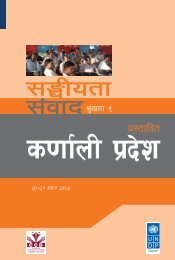
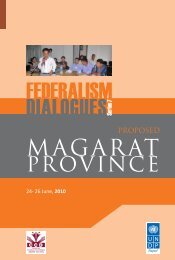
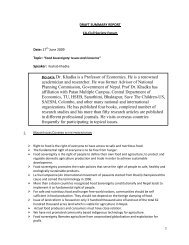
![+ljwfg;ef, /fHosf]k'g](https://img.yumpu.com/41604075/1/184x260/-ljwfgef-fhosfkg.jpg?quality=85)
